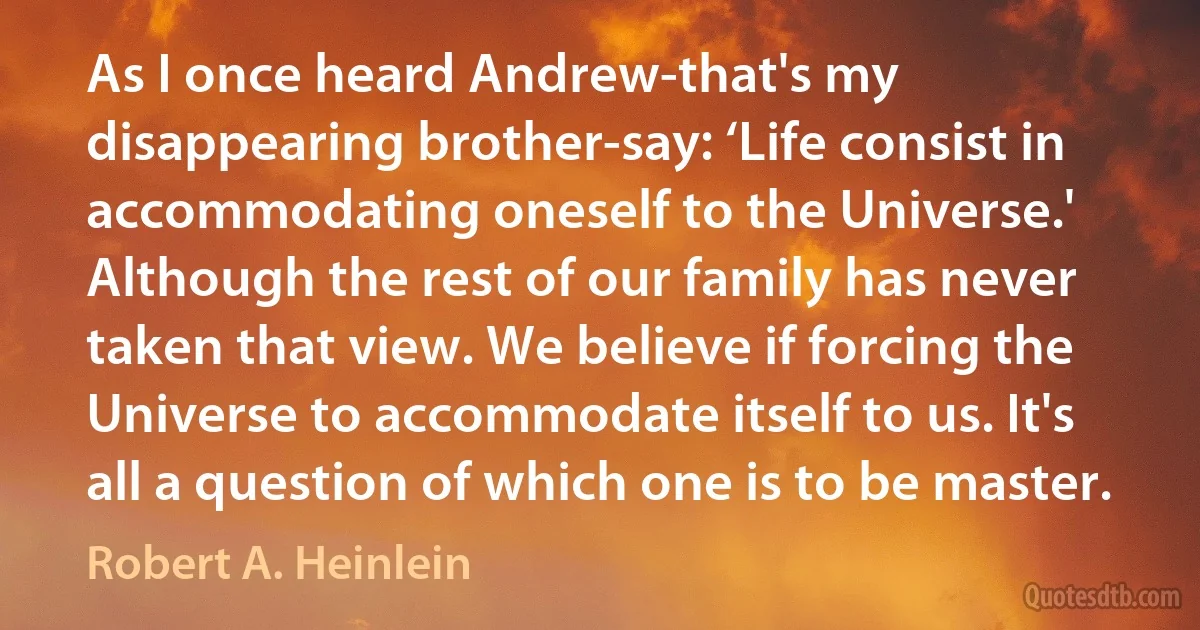Consist Quotes - page 3
Our design, not respecting arts, but philosophy, and our subject, not manual, but natural powers, we consider chiefly those things which relate to gravity, levity, elastic force, the resistance of fluids, and the like forces, whether attractive or impulsive; and therefore we offer this work as mathematical principles of philosophy; for all the difficulty of philosophy seems to consist in this from the phenomena of motions to investigate the forces of nature, and then from these forces to demonstrate the other phenomena.

Isaac Newton
The mystical trend of our time, which shows itself particularly in the rampant growth of the so-called Theosophy and Spiritualism, is for me no more than a symptom of weakness and confusion. Since our inner experiences consist of reproductions, and combinations of sensory impressions, the concept of a soul without a body seem to me to be empty and devoid of meaning.

Albert Einstein
It would be too ridiculous to go about seriously to prove that wealth does not consist in money, or in gold and silver; but in what money purchases, and is valuable only for purchasing. Money no doubt, makes always a part of the national capital; but it has already been shown that it generally makes but a small part, and always the most unprofitable part of it.

Adam Smith
In conclusion, it appears to me that nothing can be more improving to a young naturalist, than a journey in distant countries. It both sharpens, and partly likewise allays that want and craving, which, as Sir J. Herschel remarks, a man experiences although every corporeal sense is fully satisfied. The excitement from the novelty of objects, and the chance of success, stimulate him to increased activity. Moreover as a number of isolated facts soon become uninteresting, the habit of comparison leads to generalization. On the other hand, as the traveller stays but a short space of time in each place, his descriptions must generally consist of mere sketches, instead of detailed observation. Hence arises, as I have found to my cost, a constant tendency to fill up the wide gaps of knowledge, by inaccurate and superficial hypotheses.

Charles Darwin
Knowledge of God is obedience to God. Observe that we do not say that knowledge of God may also be obedience, or that of necessity it has obedience attached to it, or that it is followed by obedience. No; knowledge of God as knowledge of faith is in itself and of essential necessity obedience. It is an act of human decision corresponding to the act of divine decision; corresponding to the act of the divine being as the living Lord; corresponding to the act of grace in which faith is grounded and continually grounded again in God. In this act God posits Himself as our object and ourselves as those who know Him. But the fact that He does so means that our knowing God can consist only in our following this act, in ourselves becoming a correspondence of this act, in ourselves and our whole existence and therefore our considering and conceiving becoming the human act corresponding to the divine act. This is obedience, the obedience of faith.

Karl Barth
The proper education of the young does not consist in stuffing their heads with a mass of words, sentences, and ideas dragged together out of various authors, but in opening up their understanding to the outer world, so that a living stream may flow from their own minds, just as leaves, flowers, and fruit spring from the bud on a tree.

John Amos Comenius
Why should we put up with the present evils in our society? As opposed to the society we are visualizing, the present one can be described as a diseased one. The evils are there on all levels, international and national, and even within the smaller units such as towns and families. Of course, the disease did not appear like a bolt from the blue, either yesterday, or last year. It is the result of factors that have deep roots and long lives. These consist of privations, discriminations oppressions, bigotries, hatreds, and hostilities; poverty, ignorance, hunger, and illiteracy. Each and all of these have been left to us as ar evil heritage from the past. The fundamental difference between our situation today and that of our forefathers is that now knowledge has enabled us to realize that these evils are neither natural nor inevitable in the same way as we have found that cholera or the bubonic plague are not necessary calamities.

Muhammad Reza Pahlavi



